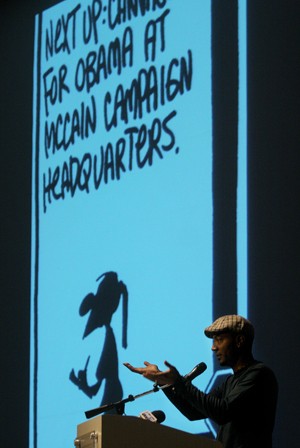Keith Knight, author of the comic series “”The K Chronicles,”” spoke to a group of roughly 100 students and community members Wednesday night at the Student Union Memorial Center about the now-infamous cartoon.
While Daily Wildcat editors said that the timing of the cartoon was unfortunate, what was even more unfortunate was the outrage that has resulted from its publication on Nov. 5, Knight said.
“”I held off on this for the longest time, because the whole campaign was so long. Then someone wrote to me and said, ‘How come you haven’t done anything about the election?'”” Knight said. “”I was afraid to do it because I knew it would be taken out of context and something would happen and it would be blown up into this whole huge controversy and that’s exactly what happened.””
Like many of his cartoons, this one was based on a real situation in which a Barack Obama campaign worker encountered a couple who referred to the then-presidential candidate with a racial slur.
“”It was such a unique situation and such an odd and weird and slightly, slightly hopeful situation that I was like, ‘Wow this couple was willing to call this guy the worst thing that he can be called and elect him to be the most powerful person in the world.’ That’s the most bizarre thing I have ever heard,”” Knight said.
Wendy Theodore, an assistant professor in African American studies, said that since this comic has been published, it is now up to the public discourse to carry out a full discussion on the role that racism actually plays in society.
“”The comic strip’s job is to put the thoughts out, and it is our job to pick them up and run with them and bring out a broader conversation,”” Theodore said. “”I was surprised to see students that I see using ‘the N-word’ every day upset about the comic strip.””
Theodore said that it is no longer an issue of whether this word should be used. It is now an issue of how to avoid its future use.
“”It’s less important on some levels that the N-word was used,”” Theodore said. “”It is more important to have a conversation about why we continue to use fighting words.””
Knight said that he committed a necessary evil by using the word because he was attempting to prove what he believed to be a profound point.
“”I didn’t sit there and go, ‘I’m going to do this to cause a ruckus.’ I didn’t use (the word) gratuitously,”” Knight said. “”When people write to me and say, ‘Well, you know, it should never be used,’ I just talk about my favorite movie, Spike Lee’s ‘Do the Right Thing,’ and that movie would not have been as good as it was if he didn’t use all of the hate speech in it.””
Terry Wimmer, a UA journalism professor, said that continued discussion about the issues of hatred and discrimination is the only way to move forward as a society.
“”How we use our own personal responsibility (in what) we read and what we see”” is a gradual process that starts with such forums as Wednesday night’s event, Wimmer said. “”That’s the only way that we can slowly ever move to eliminate racism.””
Since the situation is now in the open, Wimmer said that it would be unfortunate if it got resolved and people simply forgot about what happened.
“”This man afforded us an opportunity to talk about something that we don’t talk about enough, and we don’t talk about it in reasoned, calm ways,”” he said. “”It takes a fire. Well, it shouldn’t take a fire.””
Seema Patel, Administrative Vice President of the Associate Students of the University of Arizona, a co-sponsor of the event, said that she felt that Knight was able to answer any remaining questions about the intent of the comic.
“”Students that still had lingering questions got them answered. I think that he brought up a bunch of different perspectives that may not have been explored before,”” Patel said. “”I think that a lot of the concerns that I had been hearing and feeling, I think a lot of those have been addressed.””
Chandra Jennings, a second year graduate student specializing in public health, said that this issue was too large for one university to solve, but she felt this was at least a step in the right direction.
“”It’s a controversial issue and not something that I think can be solved in just one forum like this or in the forums that they have had in the past,”” Jennings said. “”It just needs to be continuous talk and education and knowledge and people realizing that this word should not be used.””
Knight said that he was glad that the comic got people talking. However, he wished they had been talking about something else the day after the election.
“”I don’t regret the comic that I drew. What I do regret is the comic ran the day after the election,”” Knight said. “”I did it a few weeks before and that’s when it was supposed to run.””









